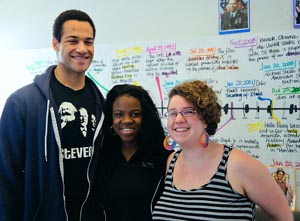Note: Campus Housing offers a variety of themed housing options. This is the first in a series of stories on themed housing at UCSC.
Meka Williams has an outgoing nature and wants to be a television personality some day, but when she came to UC Santa Cruz's Stevenson College, the young African American woman wasn't used to speaking to anyone from another culture.
"Our jokes are different. Our music is different. Our food is different," explained Williams, a 19-year-old Stevenson College sociology major who was raised in Inglewood by a hardworking, single aunt who took her and her three siblings in after their mother died.
Because of a unique UCSC housing program — The Rosa Parks African American Theme House (R.PAATH) — all that has changed for Williams. The second-year student now counts among her friends those of Asian, Filipino, and Indian descent — along with a young white woman whose painful story of the guilt she felt because her college education was financially breaking her family paralleled Williams's own story so closely.
"What I have learned is that skin color doesn't have to be the basis for relating to other people," Williams said.
Williams is now a mentor at the three-year-old R.PAATH residence hall at Stevenson College. The house began in response to student concerns about racial graffiti on campus, along with reports of racially charged incidents at another UC, according to Jim Carter, college administrative officer for Cowell and Stevenson colleges.
Current residents say the house has evolved into a place where students from a variety of races and cultures not only learn about struggles of race, gender, and class but also become a family while they work toward fostering equality in the real world.
"The goal is to develop each student's race consciousness and their dedication to activism about it," said Cynthia Friedman, a 21-year-old linguistics and feminist studies major who is one of two RAs at the house. "We want to be huge allies involved in the goals of racial equality."
Tall posters explaining the story of the Black Panther Party and Japanese American human rights activist Yuri Kochiyama hang in the stairways at the three-story R.PAATH building. Sayings from notables like Mark Twain and Emerson line the hallways. Williams's favorite is a quote from singer Dolly Parton: "The way I see it, if you want the rainbow, you've got to put up with the rain."
But the house is more than sayings on walls and corkboards with news articles and magazine stories about what people won't learn about slavery from watching the movie Django Unchained.
It is a screening of the 2005 movie Crash with an eye-opening student discussion afterward. It is pizza nights in the lounge, field trips, late-night stories in dorm rooms, and sessions where students share poetry about themselves and their lives.
"R.PAATH is about changing people's perspectives," said Desmond Vehar, a 19-year-old former football standout from San Diego who is studying computer science and game design. "It's a place where people can feel comfortable no matter who they are."
And while the house struggled initially to find its goals, it is becoming a place where students say they are able to discover their similarities while embracing their differences, where struggles are discussed and shared.
The house's collaborators include Stevenson College, Student Housing Services, Retention Services, CHES Diversity and Inclusion Program, and the African American Resource and Cultural Center.
"I think it's important for students to have a place to talk about equality, about educational equality. All the things Rosa Parks stood for," said Dr. Marla Wyche-Hall, director of the African American Resource and Cultural Center on campus.
Donnae Smith, diversity and inclusion program coordinator at UCSC, said R.PAATH is important because everyone needs a "home" where others understand your struggles and pain, a place to be yourself.
"To be able to go home at the end of the day and take off your mask, take off your pretending, take off your armor — that's important," Smith said.
It is also one of the keys to success in college, she said.
For both Williams and Vehar, who is also a mentor at R.PAATH, the house has become a family. They talk about gathering for study sessions, of being able to talk easily about their lives with others, of discovering new things about people and cultures.
It was, they said, the screening of Crash, the Paul Haggis movie about the collision of interwoven lives in racially charged L.A., that brought the goal of the house into sharp focus for them.
"It allowed us to open up and share some of our struggles," said Williams of the long and diverse discussion that followed. "We realized that our own struggles make us different, but that makes us the same."



